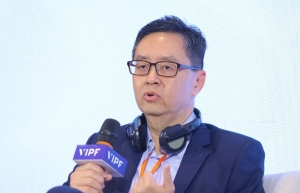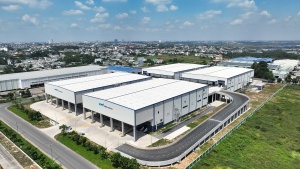Industrial real estate developers implement decarbonisation to increase appeal
 |
| BW LEED-granted Phu Nghia project in Hanoi |
In July 2022, the Vietnamese government approved the National Strategy on Climate Change for 2050, under which the country aims to lower its greenhouse gas emissions by 43.5 per cent by 2030 and achieve peak carbon emissions in 2035 and net-zero by 2050.
As part of the ongoing efforts to meet the above targets, Vietnam has been prioritising projects that use green production methods and green energy and foster eco-friendly development. The country has set a target to increase its green economy’s contribution to GDP from $6.7 billion in 2020 to $300 billion by 2050.
According to a report by Cushman & Wakefield, about 40 per cent of all greenhouse gas emissions globally come from the real estate industry, which includes commercial and residential real estate. Amid the fast-growing demand for industrial assets in Vietnam such as land, factories, and warehouses among the manufacturing, e-commerce, 3PL, and retail sectors, industrial real estate developers are playing their part in cutting emissions, starting from the planning process.
In DEEP C Industrial Zone, for example, the Belgian developer has been demonstrating its environmental responsibility through renewable energy and recycling, with an aim to transform the zone into an eco-industrial park. Last year, DEEP C kicked off its solar energy development project with the installation of solar panels on the roof of 20,000 square metre workshops in DEEP C Haiphong I.
Similarly, BW Industrial Development (BW), Vietnam’s leading for-rent logistics and industrial real estate platform, has been actively promoting initiatives to develop sustainable infrastructure.
The developer incorporates rooftop solar into all new and ongoing projects, in addition to installing weatherproof, water-resistant solar LED street lights with longer life, demonstrating its practical approach to decarbonisation.
As a true testament to its commitment and dedication to environmental, social, and governance (ESG) principles, BW has earned multiple LEED certifications, with several of its ongoing projects, including Xuyen A, Vinh Loc, and VSIP Bac Ninh, pending to be certified by the globally recognised green building certification programme.
Furthermore, over the next few years, in line with its ESG Framework and in pursuit of the Targets to 2030, BW will ensure that all new projects undergo environmental due diligence and all new greenfield development projects be subject to environmental impact assessment.
“Future-proofing assets is more crucial than ever, whether it be low-carbon solar panels or LED lighting or electric vehicles. We believe that it is only a matter of time that ESG priorities will be embedded in Vietnam’s regulatory framework. That said, a large number of the multinational companies that we liaise with daily are interested only in space that fulfils the ESG requirements of their home country. Hence, for a leading developer like BW, so long as it is efficient, ESG application is a must-have” said Lance Li, CEO of BW.
On October 1, EU's landmark tool to fight carbon leakage – Carbon Border Adjustment Mechanism entered into application in its transitional phase. In this phase, EU importers of cement, iron and steel, aluminium, fertilisers, electricity and hydrogen are required to report on the volume of their imports and the greenhouse gas emissions embedded during production.
In light of this, industrial parks, and ready-built facilities, designed and built with ESG principles in mind, such as those of BW, are ideal options for investors targeting the EU market.
 | Industrial real estate developers ready to seize on economic rebound As Vietnam's economy is forecast to rebound in 2023, industrial real estate developers are looking to capitalise on opportunities in the market. |
 | Accelerating investment capital for industrial property development Vietnam needs additional credit programmes if it wants to entice more international investors, commented Paul Wee, CFO of BW Industrial Development. |
 | Multi-story storage facilities gain traction in Vietnam As the demand for urban industrial space grows, on the back of the e-commerce boom, multi-story warehouses are currently gaining traction in Vietnam. |
What the stars mean:
★ Poor ★ ★ Promising ★★★ Good ★★★★ Very good ★★★★★ Exceptional
Related Contents
Latest News
More News
- Sembcorp Development secures licence for VSIP in Khanh Hoa (December 31, 2025 | 18:54)
- Prodezi Long An advances towards integrated eco-centric industrial park model (December 26, 2025 | 11:16)
- Amata to develop $185 million Amata City Phu Tho (December 23, 2025 | 17:49)
- Work starts on Nhat Ban – Haiphong Industrial Zone Phase 2 (December 19, 2025 | 16:43)
- Becamex – Binh Phuoc drives sustainable industrial growth (November 28, 2025 | 15:22)
- South Korean investors seek clarity on IP lease extensions (November 24, 2025 | 17:48)
- CEO shares insights on Phu My 3 IP’s journey to green industrial growth (November 17, 2025 | 11:53)
- Business leaders give their views on ESG compliance in industrial parks (November 15, 2025 | 09:00)
- Industrial parks pivot to sustainable models amid rising ESG demands (November 14, 2025 | 11:00)
- Amata plans industrial park in Ho Chi Minh City (November 04, 2025 | 15:49)

 Tag:
Tag:




















 Mobile Version
Mobile Version